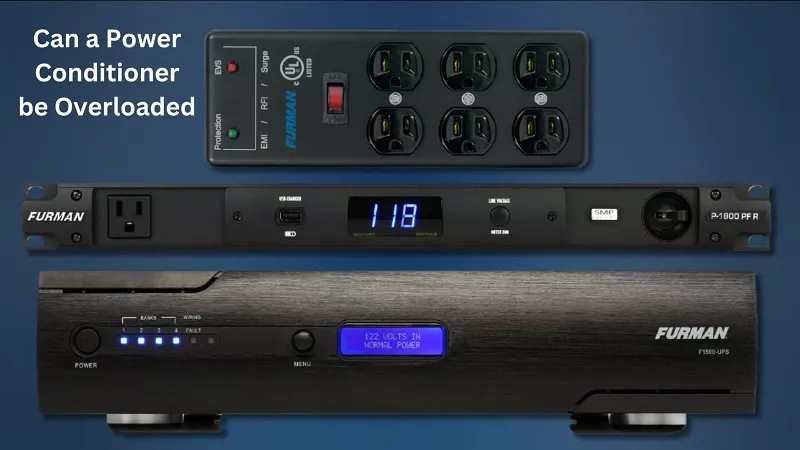Power conditioners are a popular and effective tool for ensuring a clean and stable power supply to sensitive electronic devices.
They filter out noise, spikes, surges, and other forms of electrical interference that can damage or degrade the performance of your equipment.
But can a power conditioner be overloaded? And if so, what are the consequences?
In this article, we will answer these questions and provide you with all the information you need to make informed decisions about using power conditioners.
WHAT IS A POWER CONDITIONER, AND HOW DOES IT WORK?
A power conditioner is a device that sits between the wall outlet and your electronic equipment, such as computers, audio systems, and home theaters.
It acts as a buffer, regulating the voltage, current, and frequency of the power supply to your devices, regardless of the quality of the electricity coming from the grid.
A power conditioner typically consists of several components, including:
- Surge suppressors that protect against voltage spikes and surges
- EMI/RFI filters that block electromagnetic and radio frequency interference
- Voltage regulators that stabilize the voltage to a constant level
- Isolation transformers that remove common-mode noise and ground loops
- Power factor correction that improves the efficiency of power usage
CAN A POWER CONDITIONER BE OVERLOADED?
Yes, a power conditioner can be overloaded, but the chances of that happening are slim, and the consequences are not severe.
An overloaded power conditioner may trip its internal circuit breaker or blow a fuse, shutting down the power supply to your equipment.
However, this is a rare occurrence, and it usually happens when the power conditioner is connected to more devices than its maximum capacity.
Most power conditioners have a rating, expressed in watts or amps, that indicates the maximum load they can handle safely.
Exceeding this limit can cause the power conditioner to overheat, melt, or catch fire, posing a significant risk to your safety and equipment.
WHAT CAUSES OVERLOADING IN POWER CONDITIONERS?
Several factors can contribute to overloading in power conditioners, such as:
- Plugging in too many devices that exceed the rated capacity of the power conditioner
- Using power-hungry devices that consume more power than the power conditioner can provide, such as amplifiers, subwoofers, or refrigerators
- Connecting devices with high inrush currents, such as motors or compressors, can cause a temporary surge in power demand when they start up.
- Failing to maintain or replace the power conditioner regularly can cause wear and tear on the components and reduce efficiency.
HOW TO AVOID OVERLOADING A POWER CONDITIONER?
To avoid overloading your power conditioner, you should follow these guidelines:
- Check your power conditioner’s rating to match your devices’ power requirements.
- Do not connect more devices than the maximum capacity of your power conditioner.
- Use power strips or extension cords with surge protectors and overload protection instead of daisy-chaining power conditioners.
- Turn off or unplug devices not in use to reduce the overall power demand.
- Avoid using power-hungry devices that are not necessary, such as space heaters or hair dryers, especially if they are not compatible with your power conditioner.
- Have your power conditioner inspected and serviced by a qualified technician periodically to ensure it is working correctly and efficiently
WHAT ARE THE RISKS OF OVERLOADING A POWER CONDITIONER?
The risks of overloading a power conditioner are relatively low but should not be ignored.
Some of the potential consequences of overloading a power conditioner are:
- Tripping the circuit breaker or blowing a fuse, which can interrupt the power supply to your equipment and cause data loss, system crashes, or hardware damage
- Damaging the internal components of the power conditioner, such as the capacitors, transformers, or rectifiers, can lead to reduced performance, shortened lifespan, or complete failure.
- Overheating the power conditioner, which can cause the insulation to melt or catch fire, posing a risk of electric shock or fire hazard
- Creating a power surge that bypasses the power conditioner’s protection and affects your equipment, defeating the purpose of using a power conditioner in the first place
Therefore, it is essential to use power conditioners properly and avoid overloading them.
By following the guidelines mentioned above and using common sense, you can ensure that your power conditioner provides reliable and safe power to your sensitive electronics.
CONCLUSION:
In conclusion, a power conditioner can be valuable in ensuring your electronic equipment’s clean, stable, and reliable power supply.
However, it is essential to understand its limitations and potential risks, including the possibility of overloading.
By using a power conditioner correctly, following the guidelines mentioned above, and consulting with a qualified technician if necessary, you can enjoy the benefits of improved performance, protection, and longevity of your equipment.
And remember, if you ever have doubts or questions about using a power conditioner, always err on the side of caution and seek professional advice.
Can a power conditioner be overloaded? Yes, but with proper usage, it is unlikely to happen.
FAQs:
Can a power conditioner damage my equipment?
No, a power conditioner cannot damage your equipment if used correctly and within its rated capacity. On the contrary, a power conditioner can protect your equipment from damage caused by electrical interference or surges.
What is the difference between a power conditioner and a surge protector?
A power conditioner is more advanced and comprehensive than a surge protector. While both can protect against voltage spikes and surges, a power conditioner also filters out noise, EMI/RFI, and other forms of electrical interference, stabilizes the voltage, and corrects the power factor. A surge protector only provides surge protection and does not regulate the power supply.
Can I plug a power conditioner into a UPS?
Yes, you can plug a power conditioner into a UPS (Uninterruptible Power Supply), but it is unnecessary, as most modern UPS units have built-in surge suppression and voltage regulation. However, if a particularly sensitive or critical device requires extra protection, you can use a power conditioner with a UPS.















